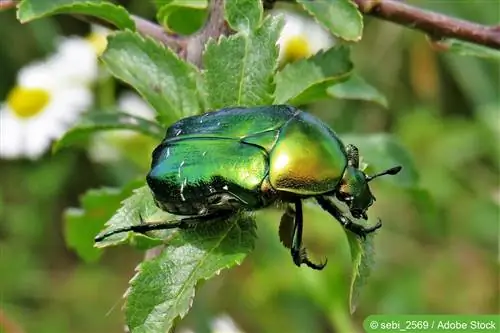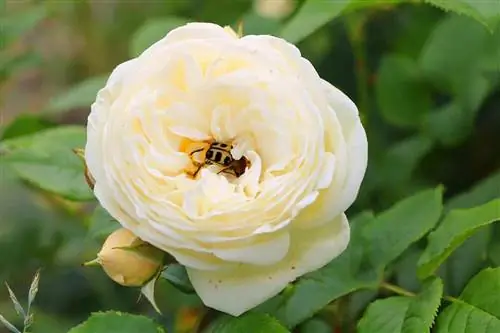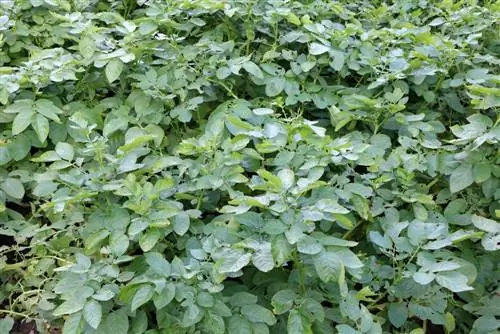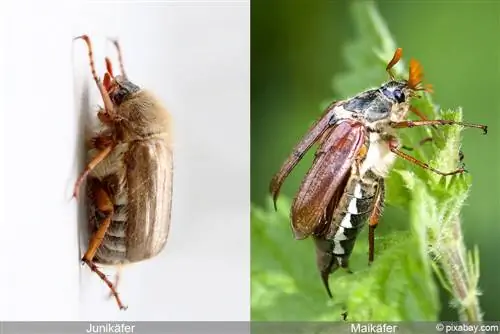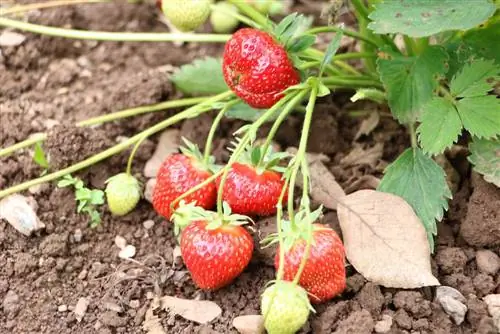- Author admin caroline@plants-knowledge.com.
- Public 2023-12-17 03:39.
- Last modified 2025-01-24 12:45.
The common rose beetle, also known as the golden rose beetle, grows up to two centimeters in size and is particularly noticeable because of its iridescent metallic cover wings. Read here whether the beneficial insect needs to be fought.
Lifestyle
While the larvae prefer to feed on rotten wood and compost and therefore usually remain undetected in the garden, the adult beetles, which appear between April and October, prefer the inside of flowers. If the infestation is severe, leaves will also be eaten. In addition to roses, the common rose beetle can also attack various fruit trees, umbelliferous plants and elderberry bushes. Overwintering takes place as larvae in dead tree trunks or in the ground. In total, the larval stage can last up to three years.
malicious image
In general, the damage caused by rose beetles is extremely minimal. Only when they occur in large numbers do the flowers and leaves of the affected plants show clear signs of damage. Since the beetles also drink the plant sap, parts of the plant can die if the infestation is severe.
Fighting rose beetles
The common rose beetle is one of the endangered species in Germany and is therefore protected. This means that only natural, non-lethal methods can be used in the event of a rose beetle infestation. Chemical-based plant protection products may not be used, even if they occur in unusually large numbers. The easiest way to combat the rose beetle is to collect it from the flowers and place it on other plants suitable for it. The early morning hours are particularly recommended, as the beetles remain almost immobile on the flowers and leaves in cool temperatures. As soon as it gets warmer, the rose beetle becomes more mobile and is sometimes very difficult to catch. No special precautionary measures need to be taken because the animals do not bite and are not poisonous.
Putting away rose beetles
In order to avoid an infestation from the outset, it makes sense to design the garden in such a way that it is as unattractive to the common rose beetle as possible. Since the female beetles usually lay their eggs on old, rotten wood and the larvae also prefer dead branches and tree stumps, the most effective measure that can be used to prevent rose beetles from settling is to remove all dead or partially dead trees in the garden. The remaining bushes and trees require careful pruning so that only living branches and twigs remain on the plant. The compost heap can also literally be a breeding ground for rose beetle larvae. Therefore it should not be piled up too high and should be moved regularly. Of course, no clippings may be added to the compost. In addition, the compost heap should be placed as far away as possible from rose bushes or other beetle favorite food plants. Since the rose beetle larvae also like moist, almost musty soil, the garden soil should be well ventilated regularly and not watered too much. Of course, you should avoid spreading bark mulch.
Overall, the risk of a severe infestation with the common rose beetle and the associated visible damage is extremely low. Since the beetles are now relatively rare and have many natural predators among birds, there is generally no urgent need for action.
Coming soon
- Damage: mostly solitary rose beetles, 14-20mm large rose beetles with strong legs and kneed antennae that eat flowers and leaves. The common rose beetle comes in many color variations from green or blue-green and blue to violet and bronze colors. The colors are always strikingly metallic and shiny. It is now very rare and is protected! Its appearance on the plants is therefore a special event, and it only causes minimal damage.
- Time of occurrence: From April to October
- Defense: Preventive: not necessary. Gentle: Damage caused by rose beetles is usually minimal. Only in exceptional cases can excessive beetles be carefully collected and placed on other flowers, for example elderflowers or the flowers of the Dolenaceae family. Harder: Not very useful and also forbidden.

